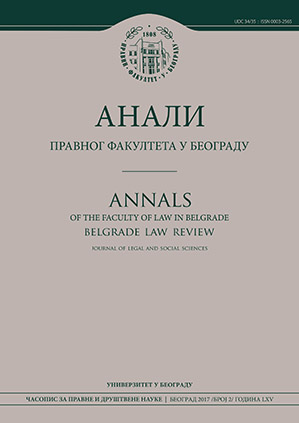УНУТРАШЊЕ ПРАВО У МЕЂУНАРОДНОЈ ИНВЕСТИЦИОНОЈ АРБИТРАЖИ: ЗАБОРАВЉЕНИ И ЗАПОСТАВЉЕНИ ИЗВОР ПРАВА
DOMESTIC LAW IN INTERNATIONAL INVESTMENT ARBITRATION: AN OVERLOOKED SOURCE OF LAW
Author(s): Sanja Đajić, Maja StanivukovićSubject(s): Constitutional Law, International Law, Law on Economics
Published by: Правни факултет Универзитета у Београду
Keywords: Applicable law in investment arbitration; Investment arbitration; Treaty claims; Contract claims; National law in international arbitration; Political power of international judiciary;
Summary/Abstract: Domestic law would seem to be a natural first choice for settling international investment disputes: investment disputes generally originate from private or commercial contracts which most often provide for applicability of domestic law. A number of issues in dispute may result from the application of domestic law, which makes the analysis of domestic law practically indispensable. Furthermore, sources of law regulating international investment arbitration do not exclude the application of national law, and some of them, like the ICSID Convention or a number of bilateral investment treaties, even require its application under certain circumstances. Despite such legal framework, international investment tribunals rarely if ever apply rules of domestic law. The aim of this article is to highlight this phenomenon of avoiding application of domestic law within the context where its application is expected, required and even desirable. The authors have singled out various techniques applied by investment arbitrators for excluding the application of national law: alleged differences between national and international law which arguably results in the exclusion of domestic law, the rejection of doctrines of res iudicata and litispendentio, non-application of the local remedies rule, etc. The causes and reasons for avoiding application of domestic law are numerous: methods of appointment of arbitrators, composition of the international arbitration collegium, the fact that respondents are usually developing countries whose law may seem too distant for international arbitrators; tendency to opt for international law as applicable for the dispute in the absence of an explicit agreement of the parties; specific power-sharing between international and national arbitration arenas.
Journal: Анали Правног факултета у Београду
- Issue Year: 65/2017
- Issue No: 2
- Page Range: 70-90
- Page Count: 21
- Language: Serbian

